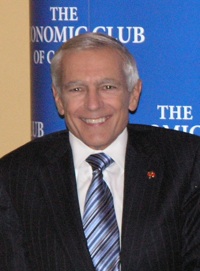
Features
Bioenergy
Ethanol
Ethanol and energy security
 WEB EXCLUSIVE
WEB EXCLUSIVE
Ethanol and energy security
Biofuels are the way to U.S. energy security, and
their markets must be strengthened to increase investment in biofuels
development.
October 6, 2009 By Heather Hager
Oct. 6, 2009, – Biofuels are the way to U.S. energy security, and their markets must be strengthened to increase investment in biofuels development. This was the message given by General Wesley Clark during a visit to Canada on Sept. 29, 2009. About 40 guests of Greenfield Ethanol and 60 others attended the evening in Toronto, hosted by the Economic Club of Canada and sponsored by the Canadian Renewable Fuels Association and the Financial Post.

|
|
| General Wesley Clark engaged in a moderated conversation with Diane Francis of the Financial Post. |
General Clark has had an impressive military career, including service in Vietnam and as NATO supreme allied commander during the Serbian-Albanian conflict. Now retired from the U.S. Army, he is an advocate for the renewable fuels industry through a number of U.S. bioenergy groups. He is co-chair of Growth Energy and a member of the advisory boards of both the American Council on Renewable Energy and the Energy and Climate Change focus area for the Clinton Global Initiative. During his visit, he talked about war, politics, and bioenergy—specifically, corn-based ethanol.
 |
|
| About 100 participants listened to General Clark speak about the future of U.S. corn ethanol. |
“We’re sending hundreds of billions of dollars a year overseas [for oil], and that money is not being used to promote American jobs, or Canadian jobs,” says Clark. “We’re trying to change and bring in biofuels.” Ethanol technology and the productivity and supply of corn are keeping pace. However, the big-oil lobby and restrictions of the federal Clean Air Act are impeding ethanol expansion, says Clark, because they’re curbing market demand for ethanol.
The big-oil lobby is behind various efforts to discredit corn ethanol through the automotive, food, and environmental sectors, suggests Clark. Examples are the food for fuel debate and claims that more energy goes into making ethanol than is contained in the product. Most of these myths have already been debunked. The most recent claim involves indirect land-use change, “which would make the American corn farmer responsible for Brazilians who cut down the rainforest,” says Clark. Why? More U.S. corn means less U.S. soybeans, the price of soybeans increases, and farmers in other countries cut down forests to plant more soybeans—making foreign deforestation the responsibility of North American corn farmers.
In contrast, the relatively benign U.S. Clean Air Act requires a waiver for all fuel additives, including ethanol. In March 2009, Growth Energy and 54 ethanol manufacturers applied for a waiver to increase ethanol blends in gasoline to 15% (E15). With U.S. annual gasoline consumption at around 140 billion gallons, this would increase the allowable ethanol from 14 billion to 21 billion gallons and expand market demand for ethanol. Clark suspects that the current economic climate will favour E15 adoption: “It’ll draw in hundreds of millions of dollars investment and create 500,000 construction jobs and 136,000 full-time jobs.”
A role for Canadian farmers?
What role might Canada and Canadian farmers have in U.S. energy security? Clark emphasizes that promoting ethanol is in the interest of Canadian, as well as U.S., energy security. He thinks there are ample opportunities for the two countries to work together, and he would like to see rapid adoption of E15 by both countries. Canada could even become a supplier of grain ethanol or cellulosic ethanol for the United States.
“We’re together in the energy market,” says Clark, “so I would encourage stable, strong, continuous policy leadership by the governments of both Canada and the United States.” Future directions will depend on ethanol supply and demand.